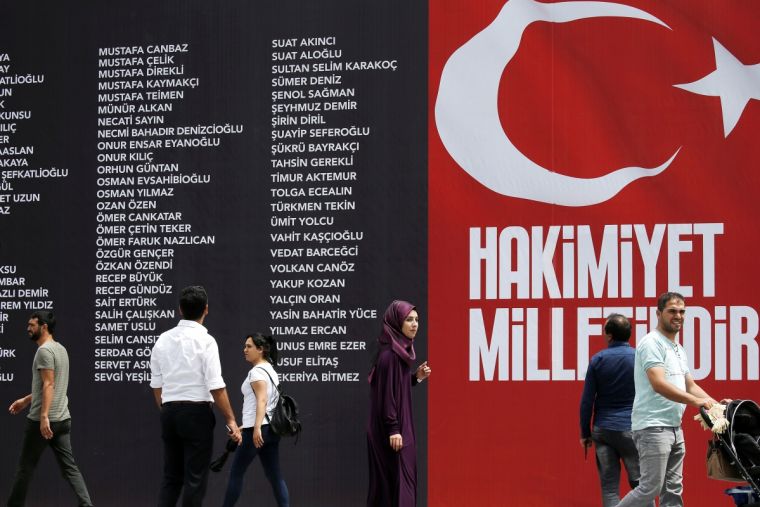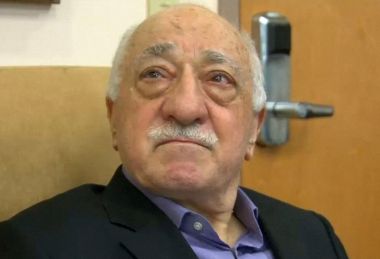Concern grows for Christians in Turkey after failed coup

Concerns are growing for the future of Christians in Turkey, the birthplace of St Paul, in the wake of the failed coup.
Two churches in eastern Turkey in places already known for historic murders of Christians were vandalised during the attempted coup, reports Middle East Concern.
In Trabzon on the Black Sea, ten people attacked the Catholic church of Santa Maria where Catholic priest Father Andrea Santoro was murdered in 2006. Muslim neighbours intervened and drove them away.
In Malatya, where three Christian workers were murdered in 2007, there was an attempt to smash the windows of the Protestant Church.
Canon Ian Sherwood, Anglican chaplain of the British consulate in Istanbul, is calling for Turkey's President Erdoğan to respect human rights and champion the rights of Christians. "As long-centuries established Christians in Turkey we are alarmed at how life is evolving in Turkey," Sherwood told The Spectator. He warns of a rising undercurrent of intolerance towards Christians and other non-Muslims and says many indigenous Christians are now trying to flee Turkey.
"Bear in mind we've had a Roman Catholic Bishop murdered, we've had clergy threatened, we've had one priest murdered 10 years ago. Any Christian leader, if they're being honest, would say that some of what's going on is quite alarming."
A century ago, as many as one in four Turks were Christian but at least 1.5 million were slaughtered in the Armenian genocide of the First World War alone. Today there are barely 250,000 Christians, fewer than one per cent of the population, with the largest number being Orthodox. Most Turks are Sunni Muslims.
Blogger Adrian Hilton of Archbishop Cranmer writes that President Erdoğan's school of Islam harks back to the Ottoman Empire and he is often called "Sultan". Erdoğan leans toward a school of Sharia which would criminalise adultery and ban alcohol, he says.
He asks: "Which is the lesser evil? The serious alarm of military coup – which is never the answer to anything – or a democratically-elected leader who seeks to create a 'proper' Islamic state, replete with its rather robust notions of unity and brotherhood?"
According to Tony Perkins writing at FRC Action, what should be "of concern to all" are the implications for the future of the Christians and other minorities in Turkey.
"Given Turkey's history of genocide against the Armenian Christians between 1915-1923 (an atrocity which Pope Francis recently recognised), with an estimated death toll of 1.5 million, the 120,000 Christians now living in Turkey are most certainly concerned."
He says the persecution and killing of Christians in Turkey is continuing and just under a decade ago, several Christians were lured into a house and horrifically tortured and slaughtered. Churches are being shut down and Christians suffering regular abuse and slander.
Earlier this year, a suicide bomber murdered five people in a Christian village the south-east of the country and last Christmas, some Muslims objected to Christmas celebrations and demanded death to Christians.
"Most disturbing, however, is the fact that the Turkish National Security Council determined and announced that Christian missionary activities are one of the nation's major security problems," writes Perkins.
Religious leaders in Turkey joined in condemning the violence of the coup soon after it happened. The Greek Orthodox Patriarch Bartholomew and the Chief Rabbi Rav Izak Haleva were among those who issued a joint declaration condemning the coup and the bloodshed. They called for love, peace and justice.
"Terror and violence wherever and whoever they come from can never be defended and regarded as legitimate. Killing one person is like killing the entire humanity and is absolutely not accepted by believers," they said.
The Association of Turkish Protestant Churches also condemned the coup and pleaded for wisdom and understanding.

Moderate Muslims are also being targeted.
Turkey has accused Imam Fethullah Gulen, who lives in the United States, of masterminding the coup, which Gulen has denied.
Radio Shema, a Christian radio station based in Ankara, reported that after the coup, the Muslim prayer for the dead was "continuously broadcast from the mosques". …
Radio Shema said: "Now more than ever there needs to be a Christian presence here in this country. It may come with some repercussion, but we must faithfully declare God's truths to the people here without belittling anyone."
Agenzia Fides also reported that in the hectic hours of the attempted coup of State, Ecumenical Patriarch Bartholomew, who is currently out of the country for a period of rest, sent a message to clergy and laity at the patriarchal office in Istanbul advising them how to deal with the situation.











